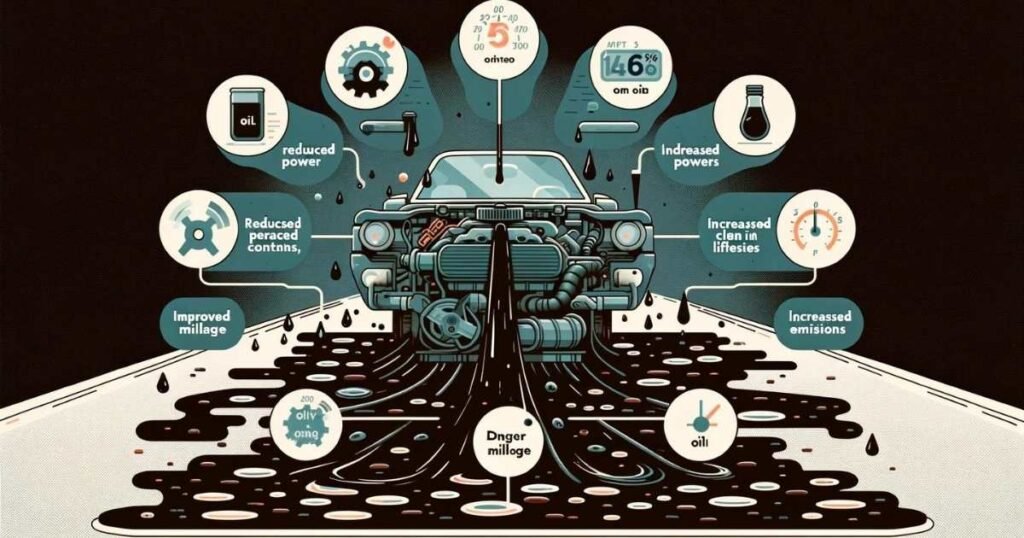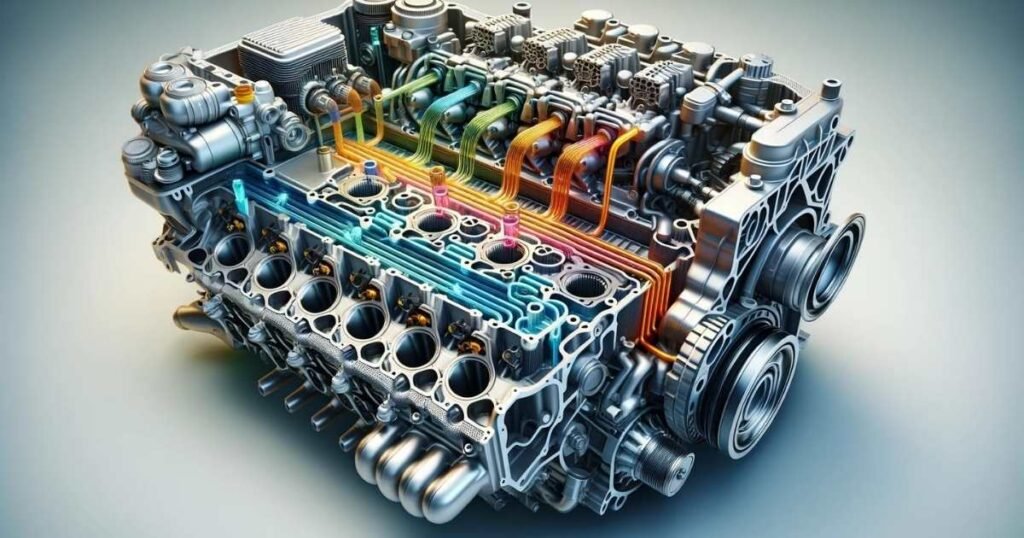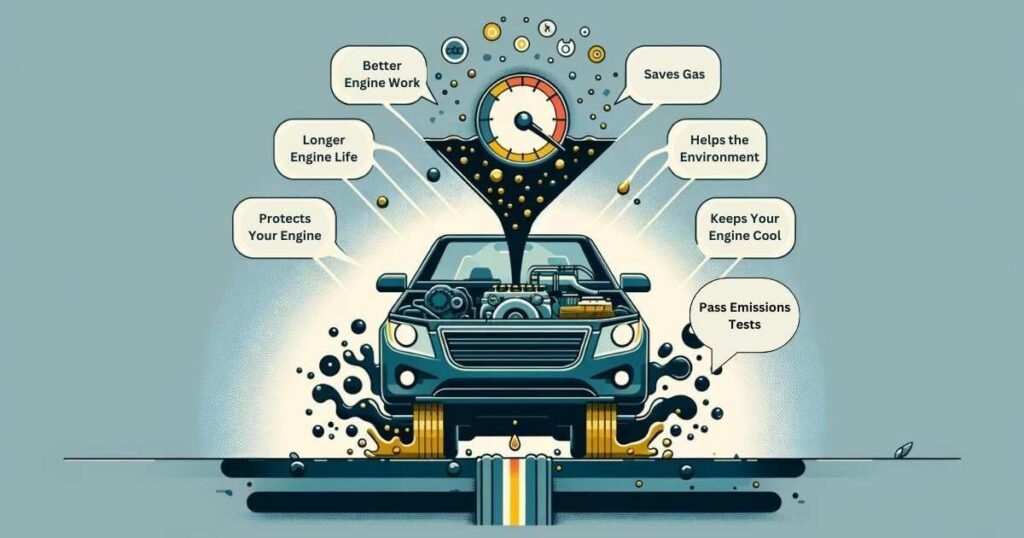I have been working with cars in my shop for over twenty years. At that time, I noticed something important. Cars with regular oil changes often run for a long time without any problems. But cars that don’t get their oil changed can have many troubles on the road. Your car’s engine is like a solid but sensitive machine.
The motor oil is like the engine’s lifeblood. It helps the engine work smoothly and, most of all, in a way you can count on. Now, let’s talk about why changing your car’s oil is a key part of caring for it.
Table of Contents
Why is Changing Your Car Oil Important?
Engine oil is essential for your car’s engine because it has many moving parts. This oil helps to keep everything moving without too much rubbing or friction. It’s like when you put lotion on your skin to make it smooth.
But as time passes, the oil gets old and picks up dirt, tiny bits of metal, and other stuff from the engine working hard. When the oil gets dirty, it can’t keep things as smooth and can even make a sticky mess called sludge inside the engine. That’s why changing the oil is essential so your engine stays happy and healthy.

The 7 Key Reasons: Why Are Oil Changes Important?
Keeping a regular schedule for changing your car’s oil has many benefits. Here are some easy-to-understand reasons:
1. Better Engine Work
When your car has clean oil, it’s like a superhero fighting against friction. This makes your engine work smoother and better.
2. Saves Gas
A happy, well-oiled engine doesn’t have to work too hard. This means your car can go further on the same amount of gas, saving you money at the gas station.
3. Longer Engine Life
Friction could be better for your engine. Changing the oil often means less friction, and your engine stays strong longer.
4. Helps the Environment
Old oil can release harmful chemicals into the air. Changing it regularly keeps your car cleaner and nicer to the environment.
5. Protects Your Engine
New oil is like a shield for your engine, keeping it safe from wear and tear and yucky sludge.
6. Keeps Your Engine Cool
Your engine gets hot when it works. Clean oil helps keep things cool by reducing friction.
7. Pass Emissions Tests
A car with fresh oil runs smoother and cleaner, making it easier to pass emissions tests that check whether your car is good for the environment.

Today’s car engines are advanced and have cool features like Variable Valve Timing, or VVT for short. VVT is a unique system that uses oil pressure to change how the valves in the engine open and close, helping the engine work its best. But here’s the thing: this system needs perfect oil to do its job right.
If the oil gets old and isn’t so good anymore, it can cause problems with the VVT. This can lead to issues with the engine. So, it’s super important to ensure the oil in these modern engines is always in good shape!
What They Do and Why They’re Essential?
Now that we’ve explored the reasons, let’s delve into the mechanics of oil changes.
Motor oil is essential for your car’s engine, like the engine’s lifeblood. Let’s think about the different jobs it does, like a busy team working inside your car:
- Fighting Friction: Oil is like a tiny, invisible shield. It slides between the engine’s parts, stopping them from rubbing too much against each other. This helps keep your engine safe from wear and tear.
- Cleaning Up: The oil in your engine is like a magnet for dirt, little bits of metal, and other stuff that shouldn’t be there. These things come from the engine as it works. The oil grabs all these bits and then gets caught in the oil filter, stopping them from harming your engine.
- Keeping Cool Under Pressure: Your engine gets hot when it’s running. The oil helps by moving around and soaking up some of this heat. This keeps the engine from getting too hot, which could damage it.

What are the warning Signs of a Needed Oil Change?
Knowing when to change your car’s oil is essential; there are some easy ways to tell when it’s time. The best method is to check your car’s owner’s manual, but here are some signs you can watch for:
- Using the Dipstick: This is a straightforward way to see how your oil is doing. Just pull out the dipstick from your engine and look at the oil. If it’s dark or has little bits in it, it’s time for a change.
- Low Oil Pressure Light: Your car has a light on the dashboard that turns on if there’s an issue with the oil. It might mean your oil is low or dirty. When you see this light, you should stop driving as soon as it’s safe and check your oil.
- Listen to Your Engine: Your engine sometimes makes different noises if it needs oil. If you hear ticking or knocking, it could be a sign that you need more or better oil.
- Strange Noises: If your engine is making knocking or grinding sounds, it could be because the oil is dirty and causing too much wear.
- Check Engine Light: If this light comes on, it might be because of dirty oil. Don’t ignore it, as it can lead to more significant problems.
- Decreased Performance: If your car feels slower than usual or isn’t as good on gas, it could be because of the oil.
- Burning Oil Smell: A strong smell of burning oil can mean a leak or the oil is burning off because of wear. This needs to be checked out right away.
By looking for these signs, you can ensure that your car’s engine stays in good shape and avoid more serious issues later.
How Often Should You Change Your Oil?
The right time to change your car’s oil depends on your vehicle’s model, your driving habits, and the oil type. Check your car’s manual for specific advice, but generally, oil changes are needed every 3,000 to 10,000 miles. Many modern cars also have systems that notify you when an oil change is due based on your driving.
What happens if you ignore the oil change at the right interval?
Your car is designed to be robust and suitable with gas, but that’s only true if the engine oil is clean. When the oil gets old and thick, it’s not as good at keeping things smooth in the engine. This causes more friction and makes the engine not work as well. Because of this, your car might not be as powerful and use more gas.
It’s hard to say precisely how much power or gas mileage you lose, but not changing your oil can add up over time. The longer you wait to change the oil, the more wear and tear your engine experiences, which could lead to serious and permanent damage.
If your engine needs more power or gets wrong with gas, fixing it can be expensive. You may need to replace the whole engine. So, regularly changing your car’s oil is important to keep everything running great!
Recommended: What happens if you don’t change your oil?
Final Thoughts
Oil changes are an essential part of car care. When you ensure your engine has clean and fresh oil, you’re helping your car stay healthy. This allows your car to run well and last a long time. It’s like feeling great when you eat nutritious foods and drink lots of water.
Don’t forget to look at your car’s owner’s manual. It will tell you how often you should change the oil, which can differ for each type of car. So, keeping up with oil changes is a big part of keeping your car happy and on the road!
Relevant:
How Long Does an Oil Change Take?
What Percentage Should You Change Your Oil?
What Maintenance Does a Car Need?
How Do I Know If I Need an Oil Change?
How Much Oil Do I Need for An Oil Change?
FAQs
What are the different types of motor oil?
There are two main types of motor oil: conventional oil and synthetic oil. Synthetic oil is generally more expensive but can last longer between changes and perform better in extreme temperatures. Your car’s owner’s manual will recommend the appropriate type of oil for your vehicle.
Why is it essential to do an oil change?
Changing the oil in your car is very important to keep the engine working well. Oil prevents the engine parts from rubbing against each other too much, which helps them last longer and avoid expensive repairs. The oil also cleans the engine by removing dirt and small metal pieces, keeps it from getting too hot, and helps your car use less gas by making the engine work smoothly.
What happens when you don’t change your oil?
If you don’t change the oil, your car might have problems. The engine parts could wear out faster, and the oil might turn into a thick sludge that blocks its flow, possibly leading to the engine breaking down. Also, your engine might get too hot, use more gas, and produce more pollution.
Does an oil change make a difference?
Yes, changing your oil makes a difference! Regular oil changes are vital for keeping your car’s engine in good condition. They help the engine last longer, lower the chance of your car breaking down, make your car use gas more efficiently, reduce pollution, and make your car run more quietly. Changing the oil is an easy but meaningful way to care for your car.


![Does Costco Do Oil Change [Updated]](https://autoroadpro.com/wp-content/uploads/2024/03/Does-Costco-Do-Oil-Change-Updated-150x150.jpg)